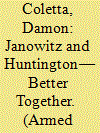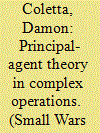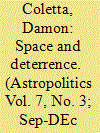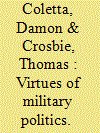|
|
|
Sort Order |
|
|
|
Items / Page
|
|
|
|
|
|
|
| Srl | Item |
| 1 |
ID:
090277


|
|
|
| 2 |
ID:
186350


|
|
|
|
|
| Summary/Abstract |
Suzanne Nielsen and Hugh Liebert recently published “The Continuing Relevance of Morris Janowitz’s The Professional Soldier for the Education of Officers” in which they argued that officer education is too enamored with Samuel Huntington’s aging theory of civil–military relations from Soldier and the State. Huntington’s ideal of objective control grants senior military advisors autonomy within their professional sphere, and it best ensures that unvarnished military expertise survives politically charged national security decision making processes intact, regardless of which party controls the White House. While these features explain Huntington’s traditional popularity with the military, Nielsen and Liebert warn that Huntington’s separation between military and civilian matters in theory engenders wishful thinking in practice, so much so that officers neglect, to the detriment of national policy, Morris Janowitz, Huntington’s cofounder of the modern study of civil–military relations. However, the civil–military community should reconsider banishing Huntington in order to appreciate Janowitz.
|
|
|
|
|
|
|
|
|
|
|
|
|
|
|
|
| 3 |
ID:
065292


|
|
|
| 4 |
ID:
101222


|
|
|
| 5 |
ID:
120311


|
|
|
|
|
| Publication |
2013.
|
| Summary/Abstract |
Originally developed for identifying costs of coordination between labor and management in economics, principal-agent theory challenged traditional explanations for friction in political relations, especially in a democracy, between elected officials and the permanent bureaucracy. Not without controversy, the approach recasts democratic civil-military relations, featuring as agent a unique, military 'bureaucrat' refining goals of the state, a role normally assigned to the principal. At the same time, principal-agent applications reached international institutions as a collective actor in their own right. Drawing from civil-military relations and international institutions, this article poses still greater expansion for principal-agent dynamics. Principal-agent theory offers significant promise in complex international operations mixing inter-state, state, sub-state, and nongovernmental organizations because it clearly delineates culturally bounded normative arguments from resource-based logics; it also suggests moves such as building flexible membership institutions ahead of time to improve cooperation among international actors during the next crisis.
|
|
|
|
|
|
|
|
|
|
|
|
|
|
|
|
| 6 |
ID:
096665


|
|
|
|
|
| Publication |
2010.
|
| Summary/Abstract |
Regardless of whether the United States decides to extend deployment of its weaponry beyond land, sea, and air to the medium of outer space, military dependence on assets stationed between low Earth orbit and geosynchronous orbit for communication, navigation, and surveillance will likely remain high. Deterrence as a strategy to protect these assets carries with it the risk that a crisis over satellites will escalate out of control. Nevertheless, when evaluated against other options on the agenda-such as space control and space avoidance-it is the only strategy for which the United States is currently equipped militarily and politically. In order to mitigate the downsides of deterrence, in particular to stave off a decision that would require disproportionate retaliation, the new United States Administration is likely to mix in tactical elements of control and avoidance. These elements, however, will not subvert deterrence as a core strategy, nor will they obviate uncomfortable and undemocratic compromises that have marked deterrence since the Cold War.
|
|
|
|
|
|
|
|
|
|
|
|
|
|
|
|
| 7 |
ID:
100076


|
|
|
|
|
| Publication |
2010.
|
| Summary/Abstract |
Venezuela, one of few Latin American countries that did not have to democratize during the Third Wave, veered hardest to the left at the turn of the century. Now, this country, despite its democratic tradition, apparently has most to fear with respect to continued civilian control of the military. This article shows how Venezuela's democracia pactada (democracy-by-pact) and its Bolivarian Revolution both permitted fusing of military with political power across policy areas. However, the emergence of a coordinate system for civilian control of the military protects Hugo Chávez even as it places certain constraints on the anti-American president. Moreover, this form of civilian control matches elements of the U.S. example. Accurate description, or coding, of Venezuela opens an avenue for improved military-to-military relations, which could, in turn, lay the foundation for constructive U.S.-Venezuelan engagement in the Western Hemisphere.
|
|
|
|
|
|
|
|
|
|
|
|
|
|
|
|
| 8 |
ID:
177001


|
|
|
|
|
| Summary/Abstract |
Sociologists and political scientists have long fretted over the dangers that a politicized military poses to democracy. In recent times, however, civil–military relations experts in the United States accepted retired or indeed still serving generals and admirals in high-ranking political posts. Despite customary revulsion from scholars, the sudden waivers are an indicator that military participation in momentous national security decisions is inherently political without necessarily being partisan, including when civilian authority defers to a largely autonomous sphere for objective military expertise. Military politics is actually critical for healthy civil–military collaboration, when done prudently and moderately. Janowitz and Huntington, founders of the modern study of civil–military relations, understood the U.S. military’s inevitable invitation to political influence. Here, we elaborate on two neglected dimensions, implicit in their projects, of military politics under objective civilian control based on classical virtues of civic republicanism: Aristotle’s practical wisdom and Machiavelli’s virtú.
|
|
|
|
|
|
|
|
|
|
|
|
|
|
|
|
|
|
|
|
|